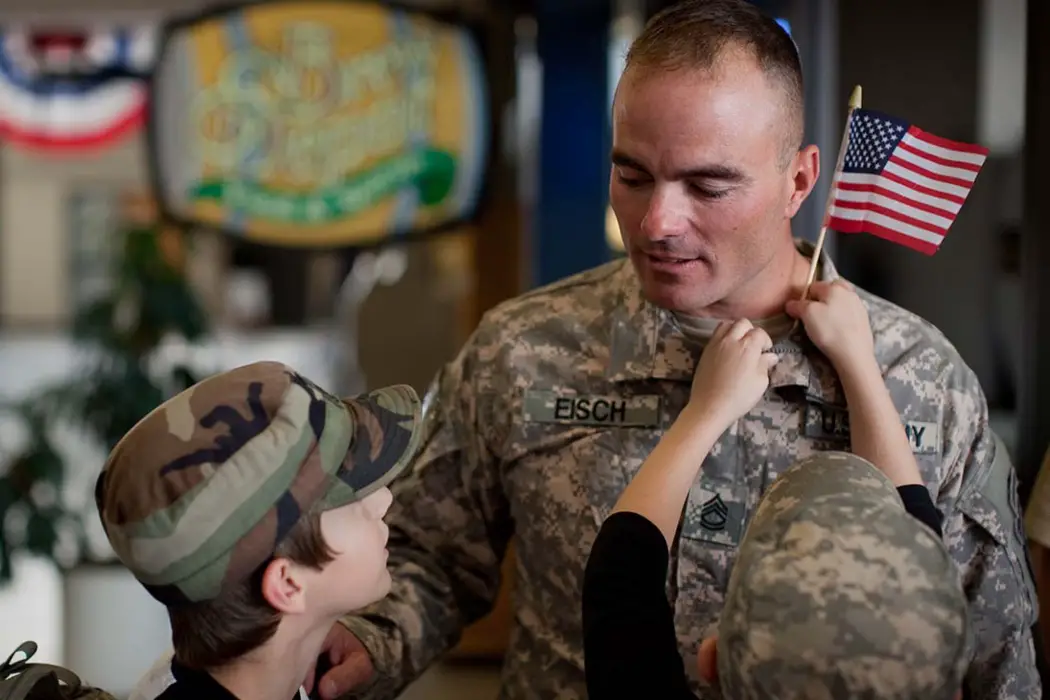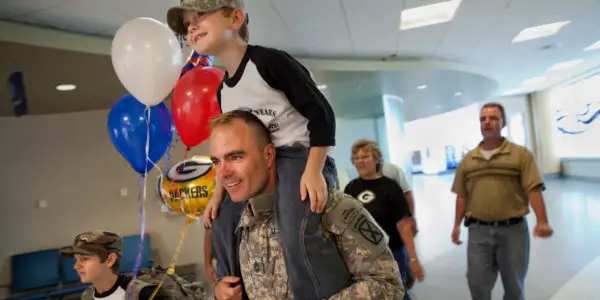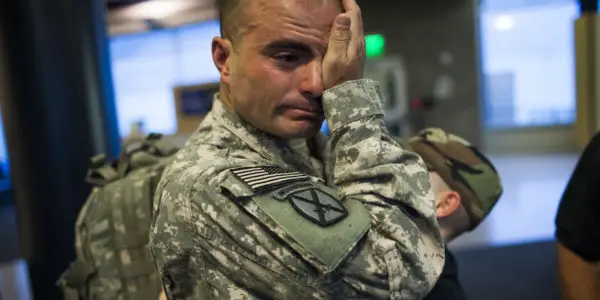FATHER SOLDIER SON: A Lopsided Exploration Of The Army Mentality

Alexandra is a freelance writer and academic pursuing her Ph.D.…
Technology has given us the power to hang onto every word, punctuation mark, and photograph that exists in the ether of those we love. When we miss someone, what do we do? Parouse through photographs and recount the memories we had with them. Our lives are constantly documented in text, photos, and recordings. We have the immense power to replay those moments and remember the good times.
Leslye Davis and Catrin Einhorn’s Father Soldier Son introduces us to the Eisch family through these technological connections. Joey Eisch scrolls through Facebook, showing various photos of his father, Brian Eisch, as well as photographs of Brian’s base in Afghanistan. To Joey and his older brother Isaac Eisch, this is all they have beyond the sporadic two-week reprieve when Brian arrives back to their Washington home.
A Balancing Act
Father Soldier Son takes on the immense task of following the Eisch family for almost nine years beginning in 2010. Davis and Einhorn follow the family from their multiple moves from Washington, New York, Washington D.C., and military bases in Afghanistan, South Carolina, and North Carolina. Davis and Einhorn offer incredible access to the lives of the Eisch family as we listen to Brian, Joey, and Isaac explain and explore their thoughts and feelings of life in the Army.

Often when films about war are made they typically fall into two categories: patriotic such as Saving Private Ryan (1998) or critical such as The Hurt Locker (2008). One of the most impressive feats that Father Soldier Son achieves is providing a somewhat neutral ground for the audience to decide for themselves if the involvement of the Army is truly worth the physical and psychological costs that we see the Eisch family experience.
What We Think vs. Reality
A particularly notable artistic direction that Davis and Einhorn chose was to largely film cinéma vérité style. The camera observes the touching moment when Brian, Joey, and Isaac are reunited at the airport surrounded by applause and tears. It notices the frustration and hurt that crosses the boys’ faces when they begin to observe their father’s behavior changing from carefree to stern after his injury.
The talking head moments that we do see are expertly placed alongside moments that either enhance or contrast what the subject just said. In an early interview, Brian stresses that he tries to be a fun dad to his boys since he doesn’t want to burden them with the struggles of war. His interview fades and he voices over his desire to be an involved father as we see Brian, Joey, and Isaac enjoy a peaceful moment of fishing.

However, after Brian’s injury – which subsequently leads to his leg becoming amputated – we begin to see that behavior change. Long takes show Brian playing video games while an interview with his girlfriend, Maria, stresses that he has become disengaged from the family. Shortly after, Brian states in an interview that he believes he has done a great job keeping the family together.
Cinéma vérité lets the viewer see that whatever Brian, Joey, Isaac, or Maria think could very well be the opposite of what is actually happening. We see the family as almost an anthropological subject rather than a family unit that we are meant to connect with. After all, we’re seeing the “Army Strong” family contain cracks and fissures that are on the brink of tearing the Eisch family apart.
Army Strong?
While it is clear that the focus of Father Soldier Son is on how a family is affected directly or indirectly by war, we are also pushed to dislike the Army and war in stark contrast to how the Eisch family feels. We are constantly shown images of the American flag that decorate the Eisch home. Brian notes that his medical and financial assistance would not be possible if not for the Army; his family lives in a rural, poor town where jobs are scarce. Finally, Brian, Joey, and Isaac stress how patriotic they feel because they participate in something larger than themselves.

It becomes clear that Davis and Einhorn disagree with this sentiment. After all, we see that Isaac and Joey suffer major insecurities because Brian expresses he does not believe Isaac is driven enough and that Joey isn’t aggressive enough – directly to their faces. Joey and Isaac say they have no idea why their father fought in Afghanistan; all they know is that he is a hero fighting some evil that could come knocking on their doorstep.
Davis and Einhorn only show us the negative of the Army experience. If this documentary truly wanted to explore the effects of the Army on the Eisch family, they could have shown the opportunities that the Army gave to Brian and his family. Instead, we merely see the tolls the family pays without much of a benefit. Isaac often expresses that he doesn’t believe the price his father paid isn’t worth fighting a war. Enough so that he constantly stresses that he does not wish this family dynamic onto anyone.
Conclusion
Father Soldier Son tackles a subject that has a long history of being seen as something you must be completely for or against. However, Davis and Einhorn expertly show that the subject of war and the Army is much more nuanced than we may think it is. While the film’s stance leans more towards anti-war, it showcases moments that explain that the Army does provide some benefits: Joey lighting up when he speaks about his father’s heroic actions, Brian explaining that he wouldn’t have the same career opportunities if he did not enter into the military, or the happiness in the silent moments when the Eisch family goes out fishing.
Regardless of your thoughts about the Army, Father Soldier Son offers you the opportunity to see why people join the Army rather than padding the film with patriotism or criticism.
What are your opinions about the Army? What does patriotism mean to you? Let us know in the comments below!
Father Soldier Son is to be released on Netflix on July 17, 2020.
Watch Father Soldier Son
Does content like this matter to you?
Become a Member and support film journalism. Unlock access to all of Film Inquiry`s great articles. Join a community of like-minded readers who are passionate about cinema - get access to our private members Network, give back to independent filmmakers, and more.
Alexandra is a freelance writer and academic pursuing her Ph.D. in Cinema and Media Studies. She is currently based in Los Angeles.












